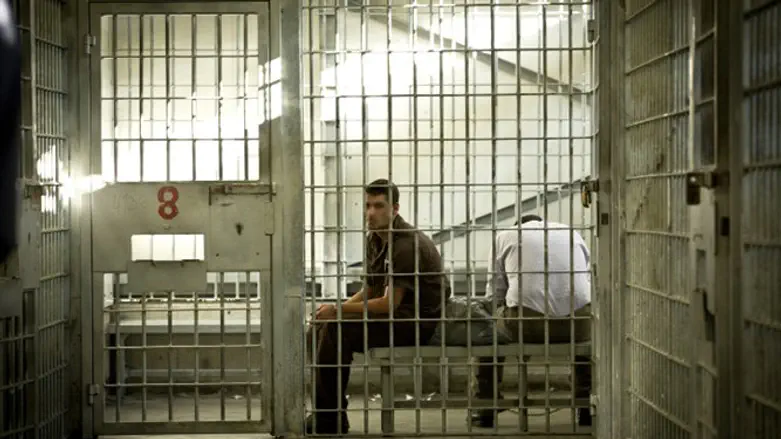
Once upon a time there was a Jew named Judah who committed a crime and who was put into prison in America. Instead of complaining, Judah decided to become the perfect prison inmate. He followed instructions and orders, and he worked hard at prison jobs until he was put in charge of prisoner affairs.
Inspired by Judah’s sterling character and industrious personality, the other inmates copied his behavior until the warden rewarded them all for their exemplary behavior, granting them special privileges not found in other prisons.
When it came time for the warden to retire, he recommended that Judah be appointed to be the new warden in his place. Judah enthusiastically accepted the distinguished position, not only for the honor involved, but because he liked helping others. With the authority he gained, he instituted many new prison reforms.
Among other things, he made sure that all Jews who received prison sentences would be sent to his prison, until it became known as the Jewish Penitentiary. Gradually, he replaced all prison workers with the prisoners themselves, which proved to be a wondrous method of rehabilitation. His management of the prison was so successful, the government awarded him financial grants to expand the grounds of the penitentiary and to improve its facilities until it became the model American prison community with the happiest prisoners, all of whom were Jews.
In his capacity as warden, and with the help of generous government allotments and monies donated by Jews outside the prison walls, Judah purchased acres of land adjacent to prison and built a nine-hole golf course surrounded by a barbwire fence, which wasn’t really needed because the inmates were so happy living in the prison, they never attempted to escape.
In fact, when Judah’s time in prison came to an end, and he was free to leave the penitentiary, he requested to remain a prisoner and continue to serve as warden. “Why go free?” he reasoned. “I have a good job in the prison. I have authority. I am admired. I command respect. I have a comfortable cottage with everything I need. Here, in the prison, I am free. Who knows what will become of me if I venture outside to a disorderly world?”
So he remained in prison, and continued on with his innovations, adding a swimming pool to the prison yard, tennis courts, and a movie theater. He ordered that the long rows of old-fashion prisoner cells be demolished, then built small condo units in their place with air-conditioning, television, and terraces overlooking the golf course and swimming pool. He built a synagogue with Reform, Conservative, and Orthodox prayer services, each with its own Rabbi, and opened a Jewish bakery, a kosher deli, and a Jewish bookstore. A group of creative prisoners even started their own local newspaper, called “The Free Prison Press.”
When inmates completed their time in prison, they too, like Judah, chose to remain in the prison rather than walk out the gate to freedom. The truth is, they didn’t feel that they were in prison at all. In fact, Jews who were free on the outside committed crimes purposefully, in order to be placed in the dream prison which Judah had built. “We want to be in prison too,” they proclaimed.
The model prisoners greeted all newcomers with open arms, saying, “Welcome! Welcome to the greatest prison in world! You’ll want to stay here forever like us!” In truth, no one ever wanted to leave. Only once did a prisoner rebel. He chose to go free when his sentence in prison came to an end. “What are you doing?” the other prisoners asked when they saw him packing a bag.
“I am leaving the prison for freedom,” he told them. “I don’t want to be a prisoner,” he told them.
“Who’s a prisoner?” they asked. “We are as free as can be!”
But the rebel had made up his mind. Taking his bag, he walked out from the prison gate. All of the other prisoners were astounded. Open-mouthed, they watched the rebel walk away. “He’ll be back,” an old-timer quipped. Sure enough, four months later, the rebel was returned. Everyone crowded around him to hear his tale. “I couldn’t take it,” he admitted. “It’s terrible out there. So many obligations and pressures. I felt like I was in prison. So I committed a crime in order to come back home.”
His buddies welcomed him back happily. They lifted him onto their shoulders and paraded him around the grounds like a hero. Judah watched proudly from his office window on the top floor of the building. He gave an order to take down all of the fences surrounding the prison. Only the front gate was kept locked and guarded – to prevent people on the outside from breaking in. The experiment worked. No one tried to escape. No one wanted to be free.
Judah had succeeded in creating a prison that didn’t feel like a prison at all.
Tzvi Fishman has been awarded the Israel Ministry of Education Prize for Jewish Culture and Creativity. Before making Aliyah to Israel in 1984, he was a successful Hollywood screenwriter and taught creative writing at the NYU School of the Arts. He has co-authored 4 books with Rabbi David Samson, based on the teachings of Rabbis A. Y. Kook and T. Y. Kook. His other books include: Arise and Shine, The Corona Bible and Tevye in the Promised Land.: